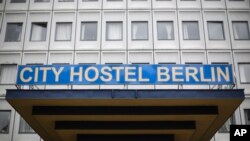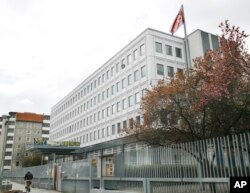As Germany moves to implement sanctions against North Korea’s nuclear weapons program, its efforts seem to be at odds with a private business in Berlin.
Poised to tighten financial screws on a regime that is making steady progress toward a nuclear-tipped missile that can threaten the U.S. mainland, the U.N. Security Council passed a resolution in November 2016, which for the first time included a prohibition on using any property that North Korea owns or leases for purposes other than diplomatic activities.
Five months after its passage, Germany stated in an implementation report submitted to the U.N. that it had begun implementing the restrictive measure.
Facing the brunt of Germany’s sanctions implementation is a youth hostel located in North Korea’s embassy compound in Berlin. The German foreign ministry, which has pressured the North Korean embassy into terminating the rental agreement with the hostel, is now squeezing the hostel owners to cease operations that indirectly benefit the Kim Jong Un regime.
City Hostel Berlin, which has housed tourists for many years, reportedly pays up to 38,000 euro ($45,000) per month in rent to North Korea.
In response to an inquiry from VOA’s Korean Service about the termination of the rental agreement, an unnamed official in Germany’s Federal Foreign Office said, “The office continuously called upon the North Korean embassy to cease all violations of U.N. and EU sanctions. The North Korean embassy now terminated the rental agreement. This is a further step to put an end to this practice.”
However, the hostel owners said the claims in media reports that they are funding Pyongyang’s illegal nuclear and missile programs are false, and they expressed their regrets in a statement obtained by VOA that the hostel had fallen prey to international politics.
The unilateral termination notice issued to the hostel by Pyongyang has no legal basis and was refuted by the hostel’s lawyers, the owners said. They added that although it is still in operation, it is not paying rent to the North Korean embassy, pending legal evaluation.
“This is a normal commercial lease signed under usual terms. All approvals and permits for our operation are issued by responsible authorities in Berlin,” the City Hostel owners said in a statement translated via Google. “In this context, City Hostel sees [the termination of rental agreement] an unacceptable intervention … and will defend itself by all means against any such intervention.”
The hostel said the German foreign ministry has yet to respond to its question concerning compensation.
Following the adoption of the resolution in November, other EU member states such as Poland, Romania and Bulgaria have also taken action against North Korea’s practice of using embassy property for commercial purposes.
Jenny Lee contributed to this report.

